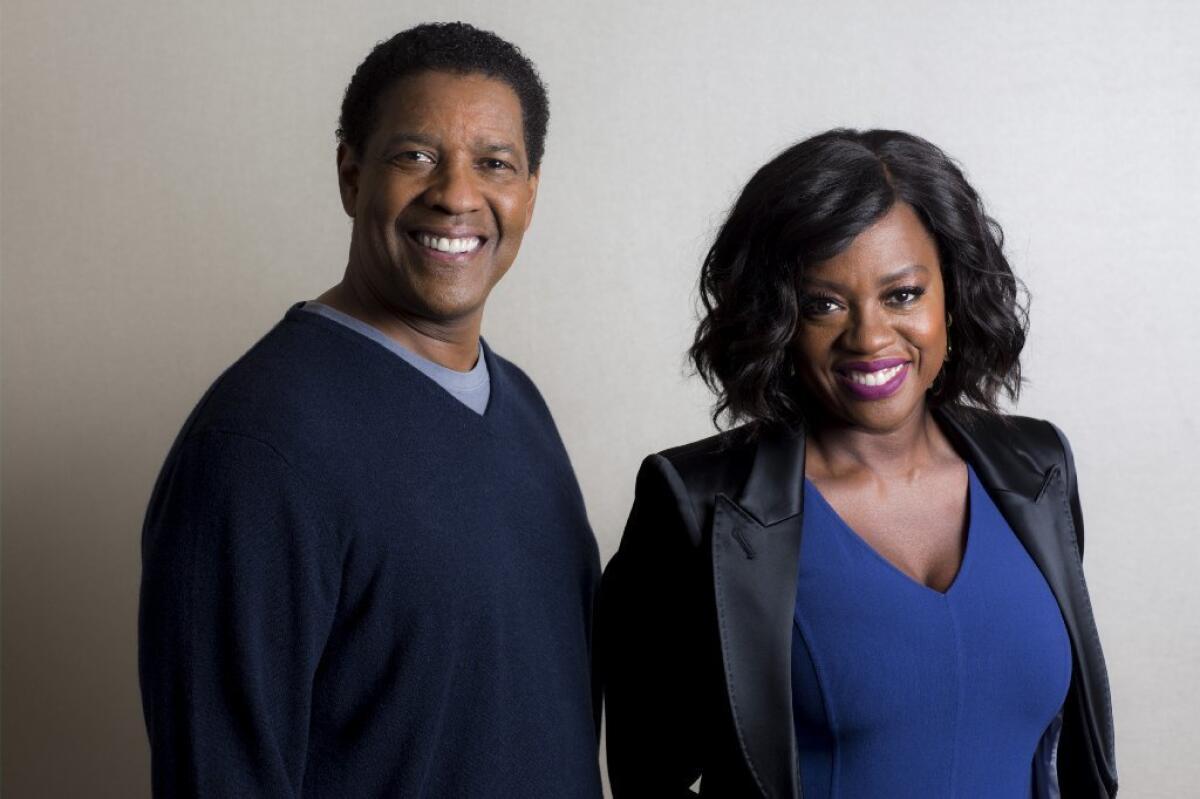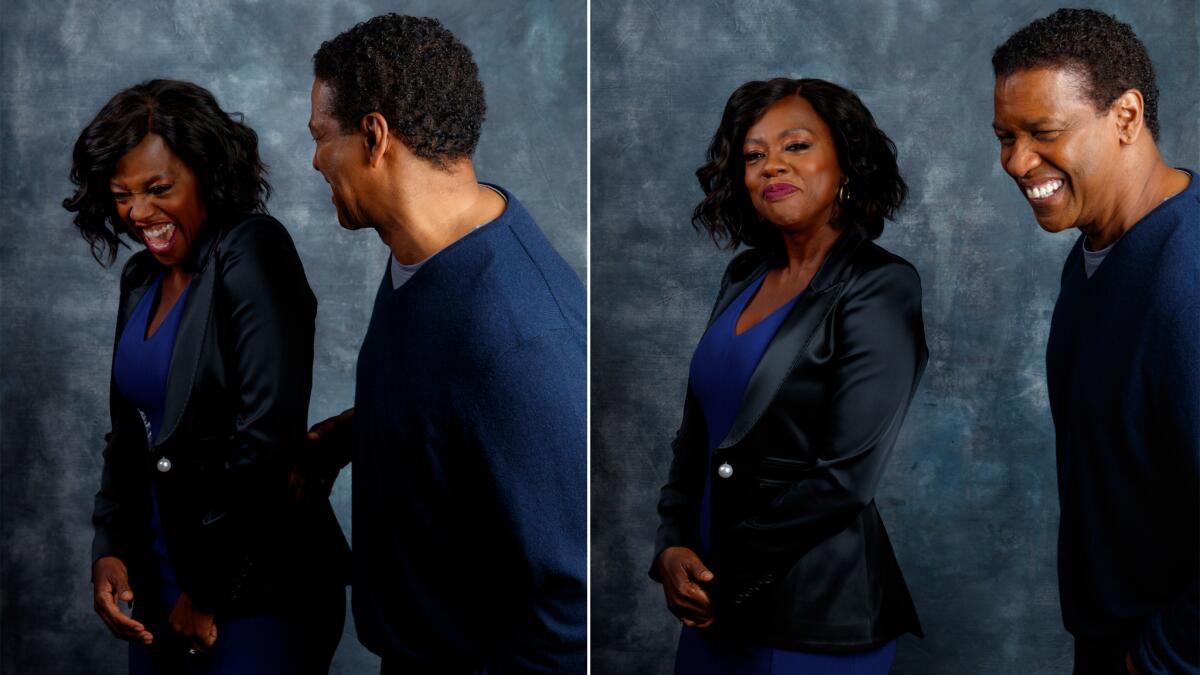Denzel Washington and Viola Davis detail their three favorite ‘Fences’ scenes

- Share via
Denzel Washington and Viola Davis played married couple Troy and Rose Maxson 114 times in the 2010 Broadway revival of August Wilson’s “Fences.” That number came up often in a recent conversation with the pair while Davis was on her lunch break from shooting her TV series, “How to Get Away With Murder.”
For Davis, that figure signifies the amount of time she needed to connect with her character, a devoted housewife living in the shadow of her husband, and then revisit Rose’s disappointments in the film version of “Fences,” which Washington directed. “Most narratives don’t have a 33-page scene — or a four-page monologue,” she says. “It’s a hard role.”

Denzel Washington directs and stars in “Fences,” which features Viola Davis and Jovan Adepo and is based on the play of the same name by August Wilson.
Washington brandishes the number as a way of explaining the studio’s confidence in his vision for the movie adaptation. He did not test screen “Fences.” “One hundred and fourteen performances? We’re good,” Washington says.
The two recently won SAG Awards honors for their work in the film. Over the course of a salad and mushrooms appetizer (Davis) and club sandwich (Washington), they talked about the three scenes that traced the arc of the shifting dynamics of the Maxsons’ life together, moving from contentment to betrayal to walled-off resignation.
Scene 1: It’s Friday afternoon and Troy and his friend Bono arrive at Troy’s home in Pittsburgh’s Hill District. Rose greets them and, briefly, but distinctly, we gain an understanding of their 18 years together.
Davis: You’ve got to sit with them. And I’m telling you, the biggest issue I have — and the biggest challenge took me 114 performances to get over — is that I didn’t want to play Rose as someone who felt swallowed up by her life. I wanted to present a woman who loved her husband and really give a portrait of a marriage that’s working. It’s flawed, like all marriages are. But it’s working.
Washington: He says, “See this woman, Bono? I love this woman. I love this woman so much it hurts. I love her so much … I done run out of ways of loving her.”
He’s not saying that thinking about softening the blow for what’s coming later. You’ve got to believe these two people love each other. If you don’t believe that, who cares? You’d be like, “Oh yeah, I could see that coming.” Without the joy, there’s no pain.
Davis: I do believe what happens in marriages is you see the cracks. You look over at your partner sometimes and you think, “Why can’t you be different? What did I get myself into?” And the next moment you say, “But I love him. I’m going to give myself to him anyway.” That’s Rose. Maybe there’s a little semblance of frustration — the gray in her hair. Her hips are wider now. She always has the apron on. But she’s happy.
Oftentimes, when I see marriages on screen, it’s, “We want to cast someone who you’re attracted to and have a sexual tension with.” And that’s part of marriage, but it’s more than that. When you see two people together, there’s more that connects them other than sex and feeling like they’re going to be skipping down the street at the end of the day. And that different kind of connection that binds us took us 114 performances to get because it’s deeper.
Washington: I told all the actors, “Let’s start at the beginning, not where we left off. Don’t assume we know the end. Let’s look for the love as much as we can. Let’s infuse as much love so when things turn it means something.” Not in a false way. They really do love each other. But you know, life happens and he made a serious mistake.
I shot a scene in a bar as part of that six-month, passage-of-time sequence, a little one of me with Alberta [the woman Troy impregnates]. And women didn’t like it — for obvious reasons. But somebody said to me — which made me cut it — that they didn’t know it was Alberta. They thought it was another woman. And Troy had told Bono, “I wasn’t out there looking for nothing.” That has to be true. Otherwise, he’s not just a womanizer but a liar as well.
Scene 2: Troy confesses that he has cheated on Rose with another woman, a woman who’s now pregnant. And he’s not going to stop seeing her. Devastated, Rose nearly collapses and then vents her hurt and anger. Between camera coverage and close-ups, Davis performed her long monologue 23 times for the film.
Davis: My whole theory about that speech is that it would be every woman’s speech if they’ve been in a marriage for a long time and their husband came home and said, “You know, I got another woman pregnant.” Because there’s not one woman who hasn’t sacrificed a hell of a lot for her marriage. We’re the sacrificers.

It was comfortably uncomfortable. It’s difficult to play someone who has a whole life going on inside her all the time that’s not being verbalized.
— Viola Davis
People ask if it was easy to slip back into being Rose. It was comfortably uncomfortable. It’s very difficult being in the scenes, but always in the background, to be part of something, but not. It’s difficult to play someone who has a whole life going on inside her all the time that’s not being verbalized. And it’s difficult to play a woman who absolutely didn’t see this coming.
Washington: What’s Troy thinking she’s going to say to him? I don’t think he thinks that far in advance. Not every man walks into a situation where he’s going to reveal news like that to his wife and be nice about it.
Davis: I always say that there’s one moment in a person’s life that is no-holds-barred, lack-of-vanity, absolutely traumatizing. It could be when a parent dies. It could be a really bad breakup where you have the snot-dripping, leaving-poop-and-pee-on-the-floor moment. Those are the moments you try to forget as much as possible because they are not our shining moments. They are moments that are purely animalistic where you’re operating out of instinct.
I truly believe what Marlon Brando says — there are times when you’re in conversation with someone and you’re fighting for your life. And that’s this scene. Rose is fighting for her life. Her life is her husband and her son. That’s her purpose. He’s taken that all away.
Washington: That scene hits such a nerve. August Wilson just sucks you in from the beginning. Everything about the place and the people — that backyard — looks so real and familiar. They’re laughing, having a good time. “Oh, it’s just like us.” And then things start to happen. [He adopts a glum tone.] “Oh. It’s just like us.” You know, it’s just like us until it really is.

Denzel Washington and Viola Davis in a scene from “Fences.”
Scene 3: Troy returns from the hospital with his newborn baby daughter. The mother, Alberta, died in childbirth. Holding the baby, Troy, feeling scared and alone, asks Rose to help care for her. Rose consents and then delivers the knockout line: “From right now … this child got a mother. But you a womanless man.”
Washington: I remember doing it on stage one night and I came in with the baby and some woman says, [Loud sigh] “Oh, Denzel.” [Laughs]
Davis: As an actor, there’s always that thing that you’re playing and then there’s the other side of it that’s fighting against the thing that you want. And the thing that Rose is fighting against is that she wants that baby. But she’s not going to let Troy know. That gives the scene a place to go.
Washington: I could always feel the tension in the audience in this scene. They want Rose to say something because they themselves want to say something to Troy. By this point, their feelings are pretty strong on the subject! But even with all that, I don’t think they expect Rose to say that.
Davis: “You a womanless man.” Every woman has an idea in her mind of what they would say in that moment, but I don’t think they would have said it that perfectly.
Washington: After she says that, I put my head up and he’s trying to be a man, trying to find a way to be on top. And she’s walked away. It’s like, you’re on your own, buddy.
That moment and then later, him alone in the bedroom before he starts yelling out the window, where you go, “No, he can’t play baseball anymore.” He’s just an overweight old man with a big gut. You want to hate him and you want to love him. He’s taking care of his brother and he did this awful thing.
Viola just says it so great about these characters: They’re unapologetic. They’re flawed. They’re human. You’ve got to deal with them, warts and all. And that’s the power of the story. They are us.
See the most-read stories this hour »
Twitter: @glennwhipp
ALSO:
Viola Davis, queen of all she surveys, on returning to ‘Fences’ six years later
Denzel Washington recognizes the ‘honor’ of speaking August Wilson’s words in ‘Fences’
Adapting August Wilson: How his play ‘Fences’ became a movie (and why so much of his work hasn’t)
More to Read
From the Oscars to the Emmys.
Get the Envelope newsletter for exclusive awards season coverage, behind-the-scenes stories from the Envelope podcast and columnist Glenn Whipp’s must-read analysis.
You may occasionally receive promotional content from the Los Angeles Times.











